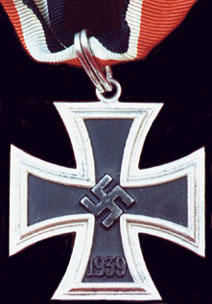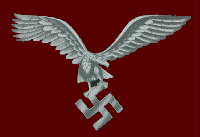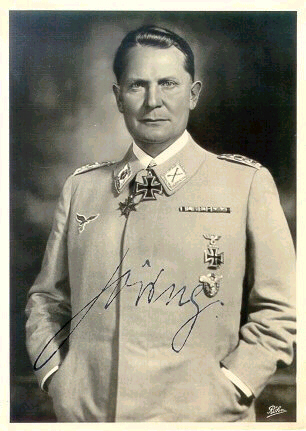|
|
|
 |
 |
Galland's Luftwaffe |
 |
 |
Reichsmarschall
Hermann Goering
1893-.-1946
 |
A member of the Richtofen Fighter
Squadron during World War 1 , Goering was a flying ace
had shot down 22 aircraft . He was a welcome recruit to
the Nazi Party in 1922 and took part in the Munich putich
in November 1933. On Hitler's accession to power he became Minister of the Interior in Prussia, Organised the Gustapo and built up Germany's new Air Force. He was the only Nazi leader with upper-class pretensions: he had an estate, called Karinhall after his first wife, which he ran as a model for conservationist policies. |
|
This is where he entertained
politicians with hunting and shooting parties. Nevile Henderson, who accompanied Goering on some of these hunts, said of him " of all the Nazi leaders, Hermann Goering, was for me by far the most sympathetic...I had a real personal liking for him...". In 1939 Goering's fortunes reached their peak when Hitler named him Reichsmarschall and his successor. However goering was not the best choise for leadership of the Luftwaffe. He lacked concentration and was given to making extravagant claims for the Air Force which it was unable to match. |
|
During the Polish campaign in 1939, the Luftwaffe had demonstrated its power, but Goering took risks and committed all available aircraft, never keeping sufficent reserves. In May 1940 Goering convinced Hitler that the Luftwaffe could finish off the encircled British Expeditionary force at Dunkirk. This was his biggest mistake and Hitler found it difficult in forgiving him. The Luftwaffe managed to sink a few British ships but 338,226 British and french were successfully evacuated, when the Wehrmacht,s tanks could have easily achieved encirclement and the surrender of the mass of the British Expeditionary force |
|
Goering's next mistake of
judgment was in the Battle of Britain; just as his
fighters were on the point of destroying Fighter Command,
he switched the attack from airfields to London. While it
dented civilian morale, the Luftwaffe lost initiative and
Hitler was forced to cancel Operation Sealion, the
invasion of Britain. Goering's next miscalculation was at Stalingrad, where he promised to supply Paulus' Sixth Army with 500 tons of fuel and food per day. This was an impossible task to fulfill and it was the last time that Hitler allowed himself to rely on Goering's judgment. |
| Goering withdrew from active
participation in High Command decisions and turned to
drugs and fantasies. He blamed his subordinates, Milch and Jeschonnek, for the continuing failures of the Luftwaffe, but the fatal weekness of the Luftwaffe dated from before the war when Goering neglected the possibilities of longer-range aircraft and only commissioned aircraft which could be used to aid ground operations. Living in his dream world Goering re-emerged in the final days of the war when, conscious of his position as Hitler's heir, he sent the Fuhrer a telegram in which he suggested that he should assume power in the event of Hitler's death or capture. Hitler was furious and ordered Goering's immediate arrest. Soon after he was captured by the Americans and was put on trial at Nuremberg, where his old vigor returned. He conducted himself with great dignity assuming responsibility for all crimes. However, a showman to the end, he cheated the hangman by poisoning himself on the eve of his execution. |